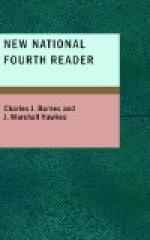20.—A HAPPY PAIR Florence Percy.
24.—ILL-NATURED BRIER Mrs. Anna Bache.
29.—LOOKING FOR THE FAIRIES Julia Bacon.
32.—BIRDS IN SUMMER Mary Howitt.
36.—THE MILLER OF THE DEE Charles Mackay.
40.—THE WIND IN A FROLIC William Howitt.
44.—COMMON GIFTS
48.—WHAT THE CHIMNEY SANG Bret Harte.
52.—THE LIGHT-HOUSE
56.—UNITED AT LAST
60.—THE BROOK Alfred Tennyson.
64.—TO-DAY AND TO-MORROW Charles Mackay.
68.—THE FISHERMAN John G. Whittier.
71.—OLD IRONSIDES Oliver Wendell Holmes.
75.—THE LEAP OF ROUSHAN BEG Henry W. Longfellow.
DEFINITIONS
GEOGRAPHICAL AND PROPER NAMES
ACKNOWLEDGMENTS.
The publishers desire to thank Messrs. Houghton, Mifflin & Co., the Century Co., Roberts Brothers, and Charles Scribner’s Sons, for permission to use and adapt some of their valuable copyright matter.
SUGGESTIONS
To Teachers
The following suggestions are submitted for the benefit of young teachers.
In order that pupils may learn how to define words at the heads of the lessons, let the teacher read the sentences containing such words and have pupils copy them upon slate or paper.
Then indicate what words are to be defined, and insist upon the proper syllabication, accent, marking of letters, etc.
In this way the pupil learns the meaning of the word as it is used, and not an abstract definition that may be meaningless.
Have pupils study their reading lessons carefully before coming to recitation.
The position of pupils while reading should be erect, easy, and graceful.
Give special attention to the subject of articulation, and insist upon a clear and distinct enunciation.
In order to develop a clear tone of voice, let pupils practice, in concert, upon some of the open vowel sounds, using such words as arm, all, old.
In this exercise, the force of utterance should be gentle at first, and the words repeated a number of times; then the force should be increased by degrees, until “calling tones” are used.
Encourage a natural use of the voice, with such modulations as may be proper for a correct rendering of the thoughts which are read.
It should, be remembered that the development of a good tone of voice is the result of careful and constant practice.
Concert reading is recommended as a useful exercise, inasmuch as any feeling of restraint or timidity disappears while reading with others.
Question individual pupils upon the manner in which lessons should be read. In this way they will learn to think for themselves.




